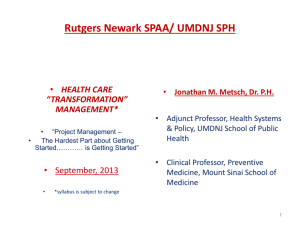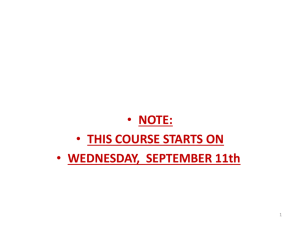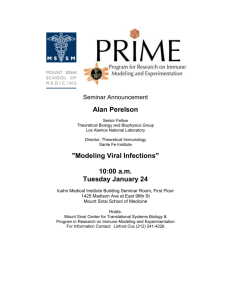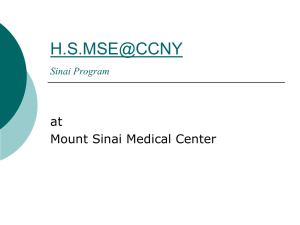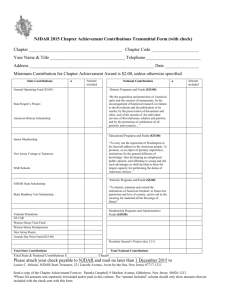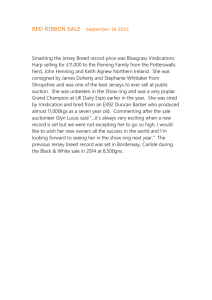The Case Study Method - School of Public Affairs and Administration
advertisement
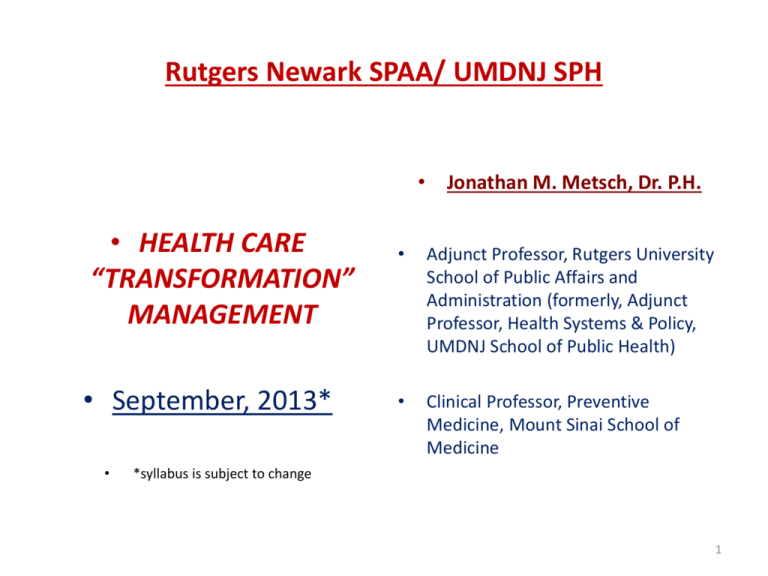
Rutgers Newark SPAA/ UMDNJ SPH • Jonathan M. Metsch, Dr. P.H. • HEALTH CARE “TRANSFORMATION” MANAGEMENT • September, 2013* • • Adjunct Professor, Rutgers University School of Public Affairs and Administration (formerly, Adjunct Professor, Health Systems & Policy, UMDNJ School of Public Health) • Clinical Professor, Preventive Medicine, Mount Sinai School of Medicine *syllabus is subject to change 1 SPAA Student Learning Outcomes • to be able to lead and manage in public governance • to participate in and contribute to the public policy process • to analyze, synthesize, think critically, solve problems, and make decisions • to articulate and apply a public service prospective • to communicate and interact productively with a diverse and changing workforce and citizenship 2 Course Objectives • 1. To learn the basics about the American health care system • • 2. To understand the implications of the Affordable Care Act • 6. To get comfortable being a discussion leader • 3. To learn to use the Case Study method as an analytical tool • 7. To meet and interact with industry leaders (your future bosses) • 4. To start using an “evidencebased” approach to management 5. To be a successful contributor in small group meetings • 8. To begin a personal career diary of “Lessons Learned” 3 Visiting Professors • • • • • • • • • • • • • • • • • • • • • Denise Rodgers, M.D. Vice Chancellor for Inter-Professional Programs at Rutgers Biomedical and Health Sciences, & former President of UMDNJ http://www.umdnj.edu/presweb/president/index.htm Mary O’Dowd, M.P.H. New Jersey Commissioner of Health (awaiting confirmation) http://www.state.nj.us/health/commiss/index.shtml Elizabeth Ryan, Esq. President and CEO, New Jersey Hospital Association http://www.njha.com/about-njha/executive-bios/ Mark E. Hopkins, Esq. Executive Director, New Jersey Health Care Financing Facilities Authority http://www.njhcffa.com/ Barry Ostrowsky, Esq. President and CEO, Barnabas Health http://www.barnabashealth.org/ • • • • • • • • • • • • • • • • • • • • Joseph A. Welfeld, M.B.A. Vice President, RelayHealth (a Division of McKesson Corporation) http://www.relayhealth.com/ Frank Goldstein, M.B.A. Vice President for Physician Services, Meridian Health http://www.meridianhealth.com/MH/index.cfm Melvin J. Stark, M.B.A. Vice President & Regional Reward Practice Leader, Hay Group http://www.haygroup.com/us/Index_NoFlash.aspx Bruce J. Markowitz, M.A., J.D. President and CEO, Palisades Medical Center http://www.palisadesmedical.org/ Reuben D. Rotman, M.M.H.S, M.A.J.C.S. Executive Director, Jewish Family Service of MetroWest http://www.jfsmetrowest.org/ 4 JONATHAN M. METSCH, DR.P.H. • • • • Dr. Metsch is: Clinical Professor, Preventive Medicine, Mount Sinai School of Medicine; and Adjunct Professor, Rutgers University School of Public Affairs and Administration. This academic year Dr. Metsch will be teaching at the Baruch/ Mount Sinai MBA Program in Health Care Administration, and in the MPA/ MPH programs at SPAA. While serving as President and CEO of LibertyHealth/ Jersey City Medical Center (and Associate Dean for Jersey City Medical Center, Mount Sinai School of Medicine) from 1989-2006, Jersey City Medical Center: was designated as a Regional Perinatal Center, Level II Trauma Center, Teaching Hospital Cancer Program, a Children's Hospital, and a Medical Coordination Center (for statewide disaster preparedness); started cardiac surgery/ interventional cardiology; and became a major teaching affiliate of Mount Sinai School of Medicine. A total replacement hospital was opened on a new site in 2004. Jonathan was Chairman of the Board of the New Jersey Hospital Association and served on the Boards of the Seton Hall University School of Graduate Medical Education, the Hudson County AIDS Consortium, the State Health Planning Board, the Hudson County Perinatal Consortium, and The Hospital Alliance of New Jersey. He served on the Governor's Advisory Commission on Hospitals, the Task Force on Affordability and Accessibility of Health Care in New Jersey, the Governor’s Advisory Council on AIDS, and the Department of Human Services HMO-Hospital Workgroup. Dr. Metsch is a strategy consultant to MphRx. http://www.mphrx.com/ MphRx offers cloud based solutions for storing, retrieving and sharing clinical images and data and is implementing a comprehensive array of "instant" clinical applications. • • • • • • • • • Recently, Jonathan served as a Board member of Jewish Family Service of MetroWest and Associated Camps, and as a Leadership Newark Coach. He was the Founder of Hudson Cradle and served on the Board of the Hudson County Child Abuse Prevention Center, and the Steering Committee of MetroWest CARES. From September, 2009 to November, 2011 Jonathan was a Commissioner of the Hoboken Municipal Hospital Authority, and part of the team that “privatized” this City-owned hospital. He was also the organizer and co-chairman of the Hoboken H1N1 Swine Flu Task Force. From 1972-1989 Jonathan worked at The Mount Sinai Medical Center (NYC) as: a faculty member of the Baruch-Mount Sinai Graduate Program in Health Care Administration; Administrator of Mount Sinai Services, City Hospital Center at Elmhurst; Associate Dean for Administration of Mount Sinai School of Medicine; and Senior Vice President for Administration, MSMC. From 1967-1970 Jonathan was on active duty in the U.S. Air Force leaving with the rank of Captain. Dr. Metsch earned: a B.A. from Queens College of the City University of New York; an M.P.A. from the University at Albany, State University of New York; and a Dr.P.H. from the University of North Carolina at Chapel Hill (from which he received the School of Public Health’s 2005 Harriet Hylton Barr Distinguished Alumni Award). 5 Course Paradigm • Using the CASE STUDY METHOD the course presentations address COMPLEX PROBLEMS and the value of LESSONS LEARNED • Case Study types: original Case Studies prepared by Prof. Metsch; Case Studies presented by senior health administrators (Visiting Professors); and iconic Harvard Case Studies • Sessions are comprised of two complementary parts paired to integrate the Case Studies with the SPAA Student Learning Outcomes and the Course Objectives 6 Complex Problems • situations where the decision-maker must integrate or reconcile at least two competing priorities that may not be linear or complementary • having to reach agreement on goals while simultaneously evaluating options • where goals are clear but political support is not • where the definition of the problem keeps changing and consensus has to constantly be reestablished • where there are so many variables it is difficult to determine the actual possible outcomes • various combinations/ permutations of the above 7 Characteristics of Complex Problems • No definitive problem boundary • No single or optimal and/or objectively testable solution • The problem is relatively unique or unprecedented • No clear stopping point • Unstable and/or unpredictable problem parameters • Contain a large number of diverse, dynamic and interdependent elements • Multiple experiments are not possible • There is no bounded set of alternative solutions • Are difficult to get good quantitative data on • Are new, constantly evolving, or require innovative design • Involve multiple stakeholders with different and conflicting viewpoints and interests 8 The Case Study Method • Cases attempt to reflect the various pressures and considerations that professionals of all varieties confront in the workplace. Using complex, realistic open-ended problems as a focus, cases are designed to challenge you and help you develop and practice skills that you may need in your future careers. Cases are also an excellent way to see how abstract principles learned in class are applied to real world situations. • Remember that case assignments involve a different kind of learning than other assignments. There is no one single answer and sometimes even the issue is deliberately not stated clearly. • Penn State University. Last update: May 11, 2006 9 What a case replicates • The idea of the case method is that you learn concepts better if you use a theory instead of just hearing about it. • The case method is based on the principle that learning occurs most when people teach themselves through working on their own problems. You will gain a greater understanding and improve judgment skills when you work through an issue instead of just listening passively to a lecture. • In order to mimic real life, many cases center around an ill-structured collection of ambiguous (occasionally contradictory) facts, opinions, incidents and documents which you must organize into a coherent whole in order to analyze the problem and provide a viable solution. • Like real-world experts, you may not have all the facts you would like and will have to exercise your best judgment which can be improved by discussion and consultation with others. Experiencing this process can be frustrating and confusing, but it is also practical and realistic. 10 Lessons Learned • • • • • • A lesson learned is useful project management information gained through experience that your organization should retain for future use and that can be relevant to other organizations. Depending on the lesson, it could be a valuable technique or an outcome that you wish to repeat or it could be an undesirable result you wish to avoid. Often, identifying your lessons learned is as simple as asking the question, “What worked well or what didn’t work so well?” • Lessons learned can be categorized as: something learned from experience, an adverse experience that is captured and shared to avoid a recurrence, an innovative approach that is captured and shared to promote repeat application, or the knowledge acquired from an innovation or an adverse experience that leads to a process improvement. http://ocio.os.doc.gov/CommerceITGroups/Commerce_IT_Review_Board/PROD01_007947 11 Week 1 – September 11th • Prof. Metsch • Case Study Method 1 • “Project Management – The Hardest Part about Getting Started………… is Getting Started” • • • • • • • • • • • Syllabus Homework Final Case Study Project Purchasing Harvard Case Studies Blackboard Lessons Learned Harvard Case Study Discussion Leaders Grades ________________ Read The “Case Study Method” on Blackboard 12 Week 2 – September 18th • Prof. Metsch • Case Study Method 2 • Homework* • The Cradle Dilemma • kel511 • Hudson Cradle + the Jubilee Center & the Hudson County Child Abuse Prevention Center 13 Week 3 – September 25th • Elizabeth A. Ryan, Esq. • President & CEO, New Jersey Hospital Association • The Affordable Care Act • • • • • • Prof. Metsch • “Big Data” Reading Reading: Summary of 2010 Health Care Reform Legislation: http://www.aha.org/advocacy-issues/toolsresources/advisory/2010/100419-legislativeadv.pdf American Public Health Association http://www.apha.org/advocacy/Health+Refo rm/ 14 Week 4 – October 2nd • Frank Goldstein, M.B.A., FACHE • Vice President, Physician Services, Meridian Health • Homework* • Performance Management at Intermountain Healthcare • HBS 9-609-103 15 Week 5 – October 9th • Denise Rodgers, M.D. • Vice Chancellor for InterProfessional Programs at Rutgers Biomedical and Health Sciences, & former President of UMDNJ • • • • • • Reading The future of academic medical centers: Strategies to avoid a margin meltdown http://www.pwc.com/us/en/health-industries/publications/the-future-ofacademic-medical-centers.jhtml Academic Medical Centers at a Tipping Point http://www.deloitte.com/us/AMCtippingpoint UM med school’s big ambitions led to big layoffs http://www.miamiherald.com/2012/07/22/2918375/um-med-schools-bigambitions-led.html • Prof. Metsch • Evidenced Based Decision Making • • • • Reading Evidence-Based Management HBS R0601E What More Evidence Do You Need? • HBS R1005X 16 Week 6 – October 16th • Joseph A. Welfeld, M.B.A. • Vice President, RelayHealth (a Division of McKesson Corporation) • Homework * • Newton-Wellsley Hospital • HBS 9-609-088 17 Week 7 – October 23rd • Mark E. Hopkins, Esq. • Executive Director, New Jersey Health Care Financing Facilities Authority • Prof. Metsch • NJ/ NY Transformational Models 18 Week 8 – October 30th • Barry Ostrowsky, Esq. • President and CEO, Barnabas Health • Homework * • Collaborating to Improve • HBS 9-608-054 19 Week 9 - November 6th • Melvin J. Stark, M.B.A. • Vice President & Regional Reward Practice Leader, Hay Group • Prof. Metsch • Restructuring a Failing Public Hospital • Case Study – Hoboken Hospital 20 Week 10 – November 13th • Bruce J. Markowitz, M.A., J.D. • President and CEO, Palisades Medical Center • Homework * • Jeanette Clough at Mount Auburn Hospital • HBS 9-406-068 21 Week 11 – November 20th • Reuben D. Rotman, M.M.H.S, M.A.J.C.S. • Executive Director, Jewish Family Service of MetroWest • Prof. Metsch • The role of the Board of Trustees (Camp, JFS, JOI, MphRx*) • * Prof. Metsch has a business relationship with MphRx 22 Week 12 – December 4th • Student Case Study Presentations • Topic Due: October 2nd • (Post on BlackBoard) • First PP Draft: October 30th • Second PP Draft: Nov. 12th • Post on BlackBoard on December 5th • jonathan.metsch@rutgers.edu 23 Week 13 – December 11th • Prof. Metsch • Building a Regional Medical Center • Case Study - Jersey City Medical Center • + • “A Seat at the Table” 24 Week 14 – December 18th • Mary E. O’Dowd, M.P.H. • New Jersey Commissioner of Health • Homework • Lessons Learned • _________________ • Prof. Metsch • Management “Wisdom” 25
